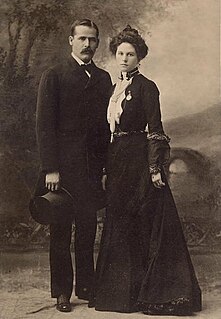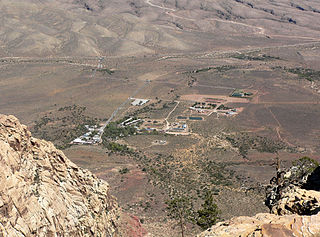
Robert LeRoy Parker, better known as Butch Cassidy, was an American train and bank robber and the leader of a gang of criminal outlaws known as the "Wild Bunch" in the Old West.

Butch Cassidy's Wild Bunch was one of the loosely organized outlaw gangs operating out of the Hole-in-the-Wall, near Kaycee in Wyoming, a natural fortress with caves, with a narrow entrance that was constantly guarded. In the beginning, the gang was referred to as the "Hole in the Wall Gang" during the Old West era in the United States. It was popularized by the 1969 movie, Butch Cassidy and the Sundance Kid, and took its name from the original Wild Bunch. The gang was led by Butch Cassidy, and it included his closest friend Elzy Lay, the Sundance Kid, Tall Texan, News Carver, Camilla "Deaf Charley" Hanks, Laura Bullion, Flat-Nose Curry, Kid Curry, and Bob Meeks. They were the most successful train-robbing gang in history.

Harry Alonzo Longabaugh, better known as the Sundance Kid, was an outlaw and member of Butch Cassidy's Wild Bunch in the American Old West. He likely met Butch Cassidy after Cassidy was released from prison around 1896. The "Wild Bunch" gang performed the longest string of successful train and bank robberies in American history. Longabaugh fled the United States along with his consort Etta Place and Butch Cassidy to escape the dogged pursuit of the Pinkerton Detective Agency. The trio fled first to Argentina and then to Bolivia, where most historians believe Cassidy and Longabaugh were killed in a shootout in November 1908.

William Lawrence Boyd was an American film actor who is known for portraying the cowboy hero Hopalong Cassidy.

Clyde Douglas "Bulldog" Turner was an American football player and coach. He was elected, as a player, to the College Football Hall of Fame in 1960 and the Pro Football Hall of Fame in 1966. He was also selected in 1969 to the NFL 1940s All-Decade Team.

El Rancho Vegas was a hotel and casino at the north end of the Las Vegas Strip in Winchester, Nevada. It opened in 1941, as the first resort on the Strip, known then as part of Highway 91. It was located at what is now the southwest corner of Las Vegas Boulevard and Sahara Avenue. The El Rancho Vegas was conceived by Thomas Hull, who owned several hotels in California and wanted to expand his operations to Las Vegas. He decided to build his new resort along Highway 91, on desert land located just outside of city limits. Hull intended to target motorists traveling from Los Angeles to Las Vegas, although his remote location was met with skepticism.

Alan Curtis was an American film actor who appeared in over 50 films.

Robert Wesley Addy was an American actor of stage, television, and film.

Rex Bell was an American actor and politician. Bell primarily appeared in Western films during his career. He also appeared in the 1930 movie True to the Navy, starring Clara Bow; Bell and Bow married the following year.
John Samuel Ingram was an American film and television actor. He appeared in many serials and Westerns between 1935 and 1966.
Mary Lee was a big band singer and B movie actress from the late 1930s into the 1940s, appearing mostly in Westerns. She did not make any screen appearances after 1944.

Arlington Rand Brooks Jr. was an American film and television actor.

Bonnie Springs Ranch was an attraction near Blue Diamond, Nevada that included an 1880s western town replica and a zoo. It is located on 63.86 acres (25.84 ha) in the Mojave Desert, below the Spring Mountains in the Red Rock Canyon area, 20 miles west of Las Vegas. The ranch has natural oasis habitat, from the spring water surfacing there.

Gene Autry's Melody Ranch is a Western variety radio show in the United States. A 15-minute pilot show aired on December 31, 1939. The program ran from January 7, 1940 to August 1, 1943, and from September 23, 1945 to May 16, 1956. The show's entire run was broadcast over the CBS radio network, sponsored by Doublemint gum. The approximately two-year interruption resulted from Autry's enlistment in the United States Army to serve in World War II. Initially titled Doublemint's Melody Ranch, the show's name was changed to Gene Autry's Melody Ranch in early 1941. Episodes were 30 minutes long except for a 15-minute version that ran from September 23, 1945 to June 16, 1946. The theme song was "Back in the Saddle Again".
The 1941 San Jose State Spartans football team represented San Jose State College during the 1941 college football season.
The 1940 Cal Poly Mustangs football team represented California Polytechnic School—now known as California Polytechnic State University, San Luis Obispo—as an independent during the 1940 college football season. Led by eighth-year head coach Howie O'Daniels, Cal Poly compiled a record of 6–3. The team outscored its opponents 148 to 83 for the season. The Mustangs played home games at Mustang Stadium in San Luis Obispo, California.
The 1941 Cal Poly Mustangs football team represented California Polytechnic School—now known as California Polytechnic State University, San Luis Obispo—as an independent during the 1941 college football season. Led by ninth-year head coach Howie O'Daniels, Cal Poly compiled a record of 5–3–1. The team outscored its opponents 84 to 72 for the season. The Mustangs played home games at Mustang Stadium in San Luis Obispo, California.

William Walter Brown was an American pioneer rancher in central Oregon. He owned two large ranches between Burns and Prineville, Oregon. Together, his properties comprised one of the largest privately owned sheep and horse operations in the United States. He was known as the Horse King of the West and the Millionaire Horse King because over 10,000 horses carried his Horseshoe Bar brand. Brown was also a well-known philanthropist who gave hundreds of thousands of dollars to a wide range of religious and educational institutions.
The 1941 Nevada Wolf Pack football team was an American football team that represented the University of Nevada as an independent during the 1941 college football season. In their third season under head coach Jim Aiken, the team compiled a 3–5–1 record. The team was invited to play in a post-season game in Honolulu on New Year's Day, but athletic events in the Territory of Hawaii were cancelled after the Attack on Pearl Harbor.
Joseph Conforte was a legal brothel owner from Sparks, Nevada, spokesperson for the legal prostitution movement, a professional boxing promoter, restaurateur, philanthropist, and Nevada statesman who embarrassed the United States Department of Justice and successfully swindled the United States. He owned the Mustang Ranch brothel, impacted federal law and the laws of Nevada, and was a fixture of pop culture, affecting people's attitudes and opinions about prostitutes and prostitution. He was married to Sally Conforte.












